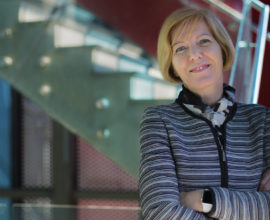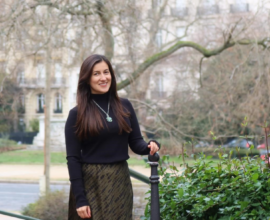Jesus Abia Arias
An odyssey from Valladolid to L’Oréal HQ
![]() Reading Time: 11 minutes
Reading Time: 11 minutes
General Manager Europe – Prada, Valentino, Mugler, V&R – L’Oreal
From his beginnings as Product Manager Biotherm Spain to being appointed the Managing Director of Prada, Mugler and Valentino in Europe, 39-year-old Jesus Abia Arias has metamorphosed whilst continuing to remain true to himself. He has made his exemplary 15-year career as part of the L’Oréal group the source of a profoundly humanistic vision of management, performance, and life.
His time spent in Miami, as Travel Retail Area Manager, then subsequently in Hong Kong as Marketing Director, has honed his fondness for others and his flair for forging his own step-by-step path towards fulfilment and success.
How has your childhood growing up in a small Spanish city shaped your life choices?
I was born in Valladolid, a beautiful and historical city in Spain ; a city where my family and most of my best friends live. My family’s values have influenced my upbringing and partly shaped the man I have become, my vision of family, respect and commitment, for example.
Sport constitutes another pillar of my younger self. I have always been passionate about sport, particularly football and basketball. Indeed, I still love sport today. Physical activity remains part of my routine, even when I’m short on time. However, I now train on my own: running, cycling, and swimming help me stay in shape and regulate my energy levels.
In contrast, I wasn’t lulled by the sirens of a life beyond Spain. I had always wanted to travel but, in Valladolid, the opportunities were few and far between: moving away had not yet become part of people’s culture. In fact, I believe I was the first student from my hometown to have taken part in the Erasmus programme, which enabled me to spend a semester in Poland.
Was it your time in Poland that first sparked your newfound interest in international experience?
As a trained engineer, specialised in IT, I very quickly found myself wanting to pursue training in business and management. Therefore, I followed up my studies with a bachelor’s degree at the University of Valladolid which allowed me to head out to Poland.
Then, I discovered the European and International Business Management Master delivered jointly by Audencia, Deusto in Bilbao and Bradford in the UK. Over a period of eighteen months, you spent a term on each campus before completing the course with a six-month internship anywhere in the world.
For me, this programme certainly ticked all the boxes, as I was able to study whilst discovering Europe at the same time, getting to immerse myself in the different cultures and meeting people from very different walks of life. This experience proved to be a real springboard in terms of the international scope of my career but also because it was at Audencia that I would first be introduced to L’Oréal.
How did this meeting come about and in what way did it become the starting point of a brilliant career at one of the world’s largest brands?
Prior to discovering the brand, I met a Spanish guy called Jaime who was working for L’Oréal in France. We remained in close contact with each other: today he has become one of my best friends. This just goes to show that every interaction counts, even those made on a campus car park!
Jaime was a talent acquisition manager who was doing the school rounds with the “L’Oréal Bus” scouting for future employees. I was at the beginning of the master’s programme, so not yet concerned by internship matters. Yet, we hit it off straight away.
L’Oréal contacted me again after my trips to Bilbao and Bradford to offer me an internship in Spain. And here I am, fifteen years down the line, still working for the company.
Now I come to think of it, this all began at Audencia, and this chance encounter with Jaime: the rest is all down to work and opportunities. I very nearly started out in Paris but, in the end, I began as Marketing Assistant for Biotherm in Madrid. Three months later, I was hired as Product Marketing Manager for Yves-Saint-Laurent, again in Madrid. The brand had just been acquired by L’Oréal: it was fascinating to follow the integration journey as it became part of the group. Yet, with my sights still firmly set on an international career, I started laying down the foundations for my network to work on this project in parallel.
So, you set about building your career early on when you first joined L’Oréal?
Consciously or unconsciously, I’m not entirely sure. One thing is certain, I very quickly struck up conversations and made my aims and motivations known, but I also listened, took advice, and kept my eyes and ears open. I adopted a proactive mindset. And very soon, I was lucky enough to have an in-house sponsor, a mentor, even though there was nothing official about it. He provided me with a great deal of support and encouragement.
I guess this is how the decision makers got to hear about the idea of sending me overseas. One day, I was asked how I felt about going to work in Miami and I nearly fell off my chair.
I was 26 years old, in a relationship but with no children at that point. It was an incredible opportunity for someone as young as myself. To this day, I remain eternally grateful to L’Oréal, for backing a profile such as mine: trusting in the future is one of this company’s key strengths. Anyhow, I jumped at the chance and headed off.
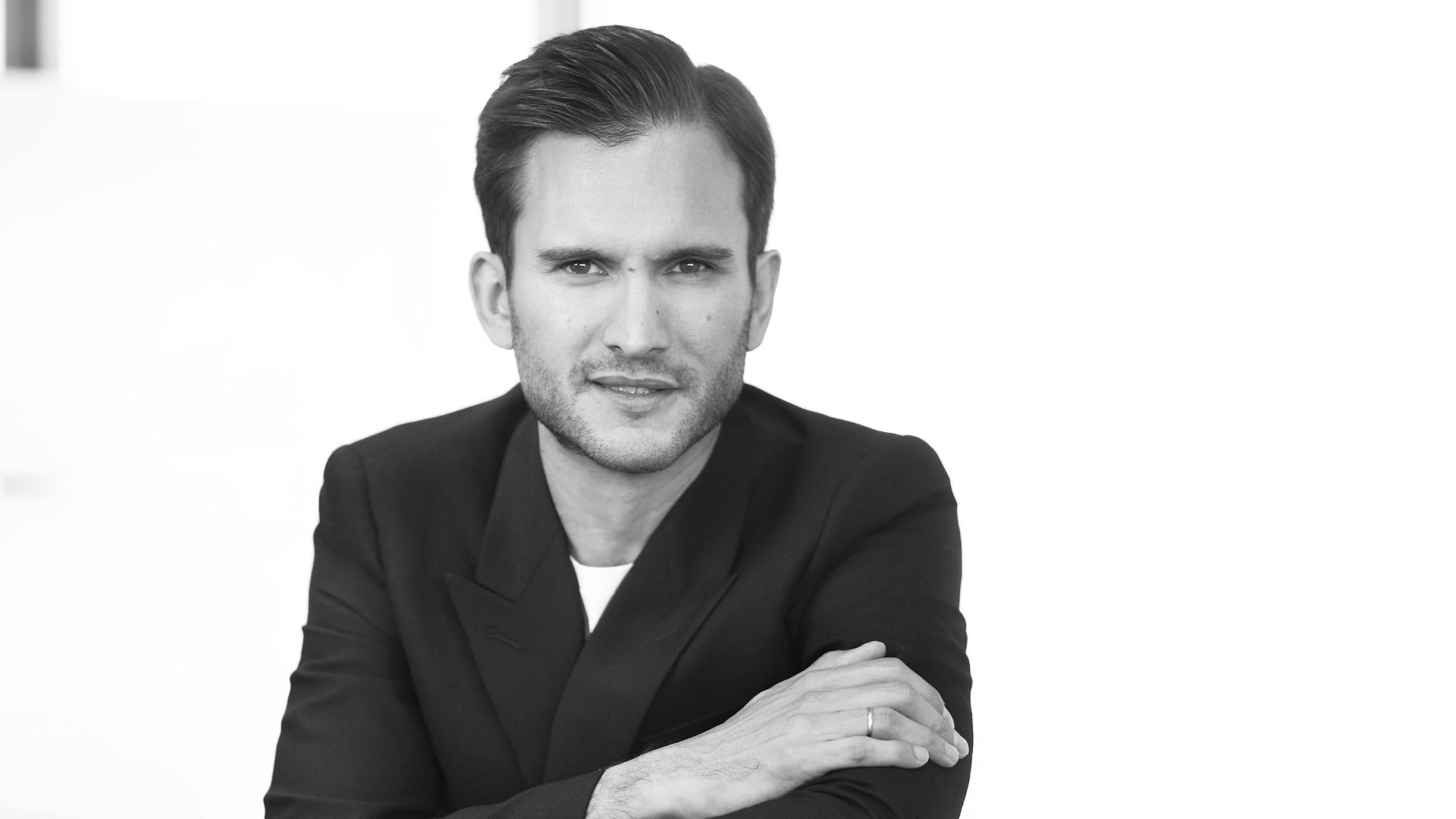
What did your initial mission in Miami entail?
I managed the Travel Retail Business, duty-free activities, for Lancôme across Latin America, Brazil, Argentina, Mexico, etc., then North America, i.e., the United States and Canada. I travelled a great deal as it covered a vast area.
The “Area Manager” is a sort of General Manager of the sector: they oversee all aspects of Profit & Loss. It is a great training ground: I was given a lot of autonomy and was taking strategic decisions as well as heading up large teams. All this at such a young age. Both positions, based in Miami but which took me from Northern Canada to Southern Patagonia, have shaped who I am today.
With three main airports in terms of business in Los Angeles, San Francisco and Vancouver, my customers were mostly Chinese. This was the beginning of the Chinese global shoppers who would become our core target market: everything revolved around the profile of these new customers, on whom I developed expert knowledge by closely observing their consumer habits, identifying what, when and where they made purchases, their areas of interest and the ways in which we could adapt our strategic vision to accommodate them.
The Hong Kong transfer seems to be on the horizon…
Even if this was not so clear-cut. I had to pay a visit to DFS, the main retailer operating in these huge American airports, based in Hong Kong. On the eve of my departure, my HR manager informed me: “Over in Hong Kong, you are scheduled to meet someone but this is merely an exploratory interview. Nothing more.”
We were enjoying our life in Miami: my wife was working for LVMH and we had just had our first child. We weren’t looking to move: so, I headed out to Hong Kong without giving it a second thought. In the end, I had six consecutive interviews out there. On my return, I gave my wife a heads-up: “Ready yourself ‘cause I’d be very surprised if they’ve had me in for six interviews for nothing.”
A few days later, I received an offer for Hong Kong: both a shock and a tough decision to make. We discussed it together but ultimately decided to accept. I became Marketing Director Asia for a range of brands in the L’Oréal group, including Giorgio Armani. And once again, this would prove an amazing experience.
Europe, North and South America then onto Asia, all very different markets and cultures. How did you go about all this?
Up until Hong Kong, I only sensed the differences on a surface level: I adapted and these didn’t prove central to my activity. However, out in Hong Kong, the cultural differences and their impact on our work environment were such that I had to reinvent my managerial approach.
Asia isn’t a homogeneous whole as perceived in the West: each country has its own culture and its own specific ways, so it’s important to bear this in mind. There were twenty-three of us in the team: Koreans, Japanese, Thais, Singaporeans, Chinese, as well as me the Spaniard. All very different and I had to adapt to each of them, whilst creating a coherent group with effective and respectful ways to work together: this was fascinating!
In what way have these various cultural approaches to leadership impacted on the manager you are today?
In actual fact, at times it is necessary to reprogramme yourself entirely from one person to the next as well as from one country to another. In the West, people seek autonomy and personal development. They want the opportunity to share their ideas and express their opinions. If you share power with them and give them responsibility, then they will deliver the work you expect of them and more besides.
In Asia, you must be much more structured. You need to have a set of priorities, allocate specific time requirements, and be very clear on your expectations, expressing when you want the work to be done for and how you expect the tasks to be presented to you. That’s just the way it is. It’s important to adapt so as not to find yourself swimming against the tide. You can’t change the embedded culture of a country: you work with what you’ve got to build the necessary bridges for effective collaboration, whilst respecting the key expectations of the group.
What’s more, I’m making some general comparisons here. Yet, there are also vast differences between Spain and France. Here in Paris, I am at the group’s global head offices, for example, and this still implies a different dimension in terms of leadership. More of a political dimension and more to do with influence. It isn’t merely a corporate or operational approach, with quantified results, but may at times constitute an attitude, a behaviour, or a feeling which fits or doesn’t fit with top management.
How did you make it to the L’Oréal World Headquarters?
By first taking a detour to Spain in 2019. Seven years after leaving the country as a Product Manager, I returned as the Yves-Saint-Laurent Managing Director for the Iberian Peninsula. So, it was back to my homeland and a return to my former team where many of the people I used to work with back in 2012 were still there.
We had our second child in the summer of 2019, and at the start of 2020, COVID and lockdown struck. We were very fortunate to be in Spain during this time, surrounded by our family and far from the very stringent containment measures witnessed in Hong Kong during the pandemic.
And voilà! I, who had been all set to start my career in Paris but had never got to carry this plan through, finally received an offer to join the L’Oréal head office in the summer of 2022, as Managing Director Europe for the Prada, Valentino and Mugler brands. It had taken me a good decade or so to finally make it to Paris but I got there in the end. I’m in charge of drawing up the business model of the brands I support as well as ensuring a homogeneous operational roll-out aligned with the principles of each brand. Prada, for instance, is a licence so staying in line with the brand’s standards is crucial for us.
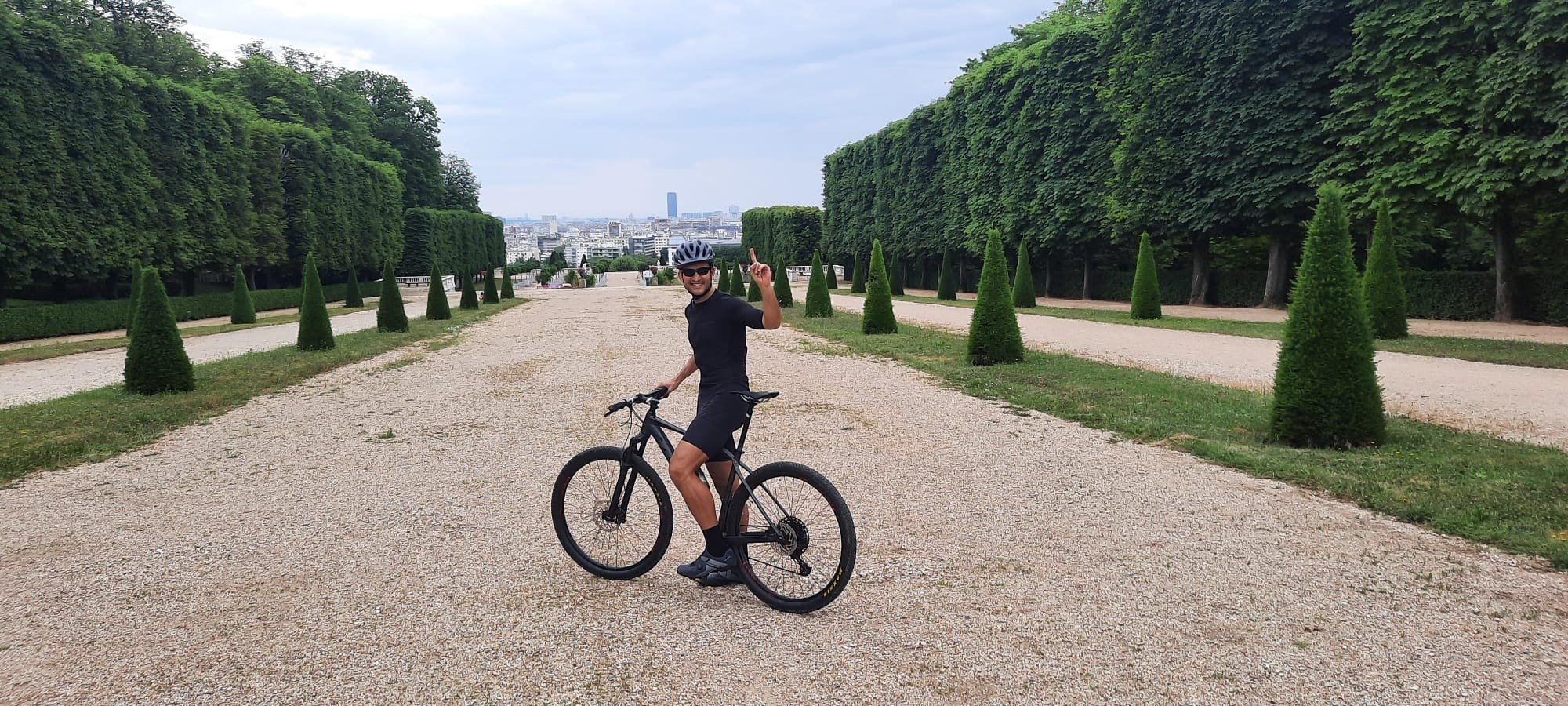
You still say “return to Spain” as you go back to your country of origin. What is your connection to your homeland now? Do you feel more Spanish or more a citizen of the world?
That’s clearly a tough question. I am a Spaniard, married to a Spanish woman, and one of my two children was born in Spain. I remain attached to this culture, its roots, and my hometown. Yet, I have also got to see other ways of viewing the world we live in, which greatly affects my take on certain subjects.
Furthermore, at times it’s difficult to be part of discussions with family and friends when back in Spain, as I am aware that each of us has their own take on a subject, coloured by our own life experiences. So, I sometimes take a back seat, without any anger, but choosing to distance myself a little, so as not to compromise my connections with those dear to me.
Today, my children attend the British school in Paris. We speak Spanish at home but they are equally at ease expressing themselves in English or French. For our part, we aren’t necessarily looking to return to Spain one day – but neither have we ruled this out! This is probably what you’d term a citizen of the world.
This multicultural approach is a real advantage for your children…
Both for them and us. I believe in collective intelligence and cooperation. This involves genuine mutual comprehension, an understanding that is based on listening, respect, and adaptability. I learned all this at L’Oréal, where diversity and inclusion are more of a way of life as opposed to an HR initiative. This is also something I endeavour to pass on to my children and my co-workers. Indeed, maybe at some future point, to a wider audience, by becoming a speaker or lecturer, I don’t know.
This notion of transmission is important to me. I very much want to share all I’ve learned throughout my career path, both my hard skills as well as my soft skills. How do you go about building a career? How do you adapt? Where do you find the keys to decipher the trends, understand others, etc.? If I look to a future personal challenge, I think I’d like to teach others.
At Audencia?
(Smiling) Why not? You never know.
What would be the first piece of careers advice you’d give to your students?
In fact, I would give them three top tips. Firstly: choose your company wisely, making sure that your expectations and the company’s plans are well aligned, in terms of its business culture, the products or services it delivers, its values, and how sustainable its commitments are over time. Make choices, take a deeper look that goes beyond the job title and salary: teleworking or not, jeans and trainers or a suit and tie. There are no wrong answers here, merely a good fit between certain individuals and certain companies.
My second piece of advice is to create a corporate network very early on, to pinpoint sponsors and find a mentor whose advice and, at times, well-chosen words will prove a key asset to propel your progress.
The third piece of advice: have patience! Do your job, deliver results, be productive and be patient. At times we may be tempted to leave for a better pay offer which, in the end, won’t prove all that worthwhile in the long term. Look at the company, not only as it stands today but also in terms of its prospects. What will your development plan look like? How will you be supported? What is your project and the company’s ability to bring this to fruition?
For while the HR teams are increasingly effective in identifying and developing talent, you alone are the one steering your career path. It is your responsibility and – sorry if this appears to be a fourth piece of advice – you must assume personal responsibility for this. Express yourself. Show up. Get the word out. Tactfully and strategically but do not let life carry you along, otherwise nothing will happen.
This goes back to the idea of having a sponsor, a mentor, people who propel you forward and provide guidance. Today, I am in turn a sponsor, this is part of my job as a manager and in my view, this is something I owe my teams.
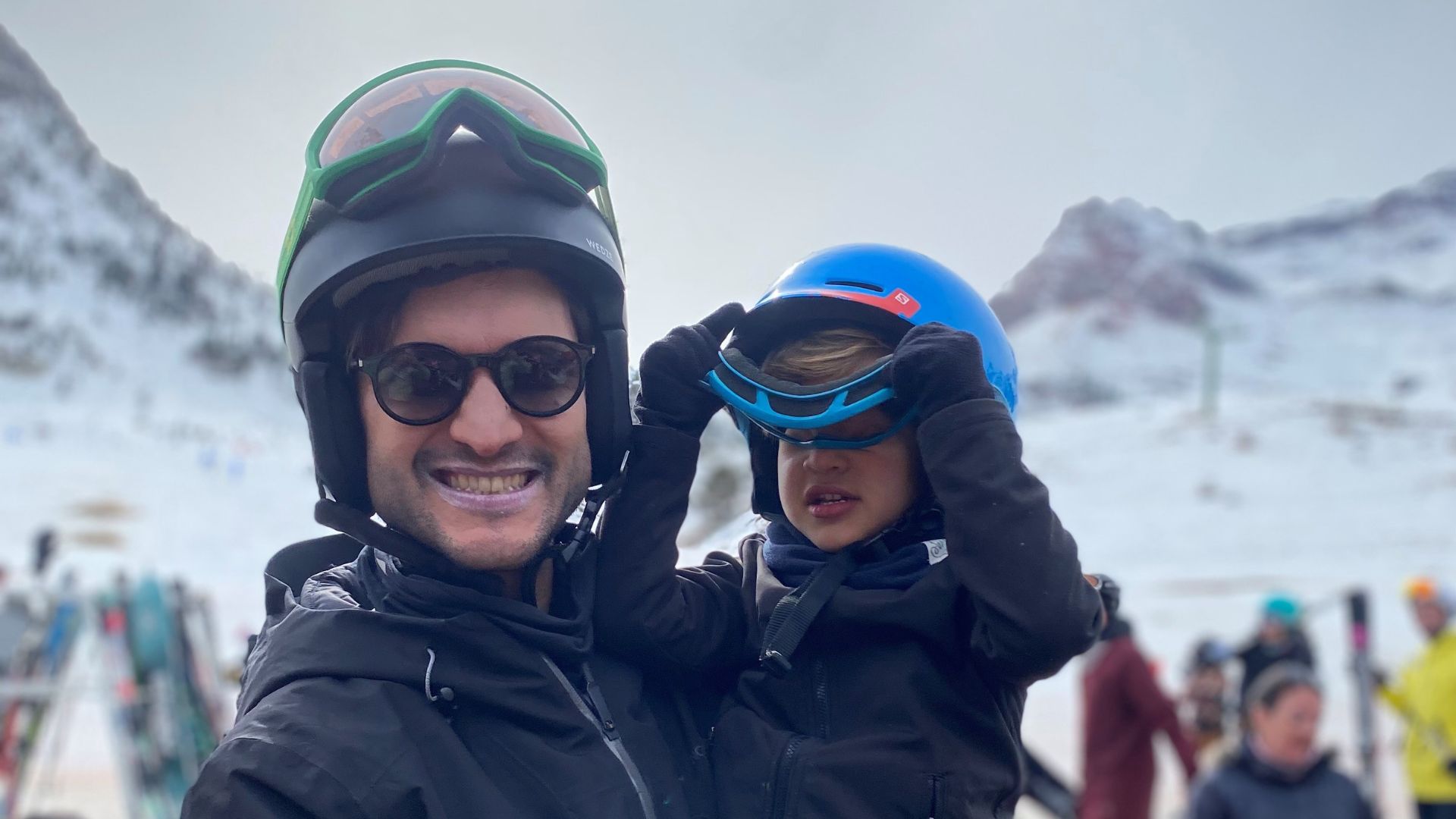
So, who are you, Jesus, outside of L’Oréal?
Someone simple really. I like sport, we discussed this at the start of the interview. Today, following several knee operations, I approach exercise with care but I still go cycling in the forest at the weekend for example.
I’m fond of reading, although I don’t read enough. I enjoy Spanish history and books on development, ‘The Servant’ for instance, a powerful book on leadership. I have become greatly interested in Strengthsfinder, the theory behind which resonates with my own convictions. Indeed, I believe it is more effective to work on your skills rather than your shortcomings: you make more headway when you have more confidence in yourself.
You have a very humanistic vision of the world: does this translate into your being committed to benevolent causes?
Not enough, I find! No doubt down to lack of time. But my wife and I have established somewhat of a tradition: every year we make a charitable donation, in lieu of our birthday present, to the World Central Kitchen, an NGO providing meals to victims of natural disasters. This may seem a small gesture, but it’s personal to us.
What can we wish for you in the future?
To see my children grow up imbued with this humanistic vision. May they always be able to challenge their own perspectives, so as not to see them as an absolute truth, but rather a perspective to be moved forward by listening and looking around them. Only then will I have accomplished my quest.
